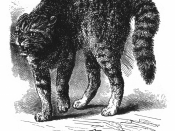Infants show a lot of variability in their temperament, or their characteristic mood, activity level, and emotional activity. From the beginning of life, some babies seem very outgoing and willing to conform the demands of the outside. On the other side of the coin, some babies seemed to have perfered the peace of the mother, and seem to be cranky, irritable and not willing to participate in their new environment. Temperaments, like emotion in the evolutionary since, evolved to allow greater survivability in the human species.
Most of the major research on an infant's temperaments has been conducted by Alexander Thomas and Stella Chess. They classified the different types of babies into three groups. The first group of children are the easy children. These children seem to fall into a nice schedule, are fairly happy, and quickly adapt into a new environment. The second group of children are named the slow to warm up children.
These children are less joyful, have less regular schedules, and slower to adapt to change. The third group of children were called the difficult children. these children tended to be glum, did not conform to any schedule, and had to give a lot of effort to adapt to a new situation. These temperaments also seem to have been determined by genes, but as with many things in psychology, environment is also involved.
Temperaments are not all that different from what we, as adults, call emotion. while there are several different views on the development of emotion, the evolutional view has take a strong position This view of the development of emotion was started back with Charles Darwin's views, which developed well over a century ago. He stated that emotions developed because of their adaptive value (as with all things in this line of thinking). Today's...


